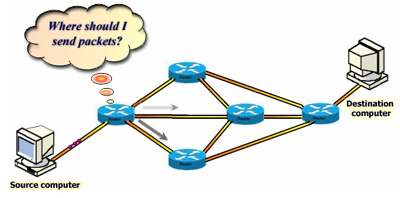Network Routing
some parts modified from R. Razavi
What is Routing?
Routing is the act of moving information across an internetwork from a source to a destination. Along the way, at least one intermediate node typically is encountered
A router is used to manage network traffic and finding the best route for packets to be sent.
What is a Routing Algorithm?
A router uses a "Routing algorithms" to find the best route to a destination.
When we say best route, we consider parameters like the number of Hops (a hop is the trip a data packet takes from one router or intermediate point to another in the network), time delay and communication cost of packet transmission.
Typically, the entire route is NOT planned but, the next best hop (or few hops) is what is given.

Kinds of Routing Algorithms
- “Global
routing algorithms"
every router must have complete information about other routers in network and traffic status of network. These algorithms also known as LS (Link State) algorithms
- "Decentralized
routing algorithms".
each router has information ONLY about the routers that is directly connected to and not about all routers in network. These Algorithms are also known as DV (Distance Vector) algorithms.
The calculation of the least-cost path is carried out in an iterative, distributed manner. No node has complete information about the costs of all network links. Instead, each node begins with only the knowledge of the costs of its own directly attached links. Then, through an iterative process of calculation and exchange of information with its neighboring nodes (that is, nodes that are at the "other end" of links to which it itself is attached), traffic hops from node to node in this iterative manner.
- Hierarchical
routing algorithms
As complexity increases of network, must group routers to avoid too large of router tables that are intractable.